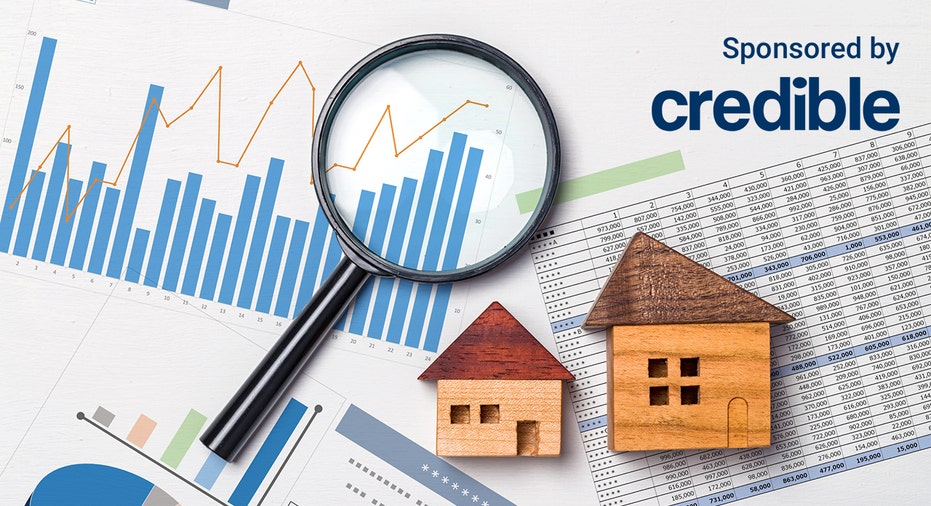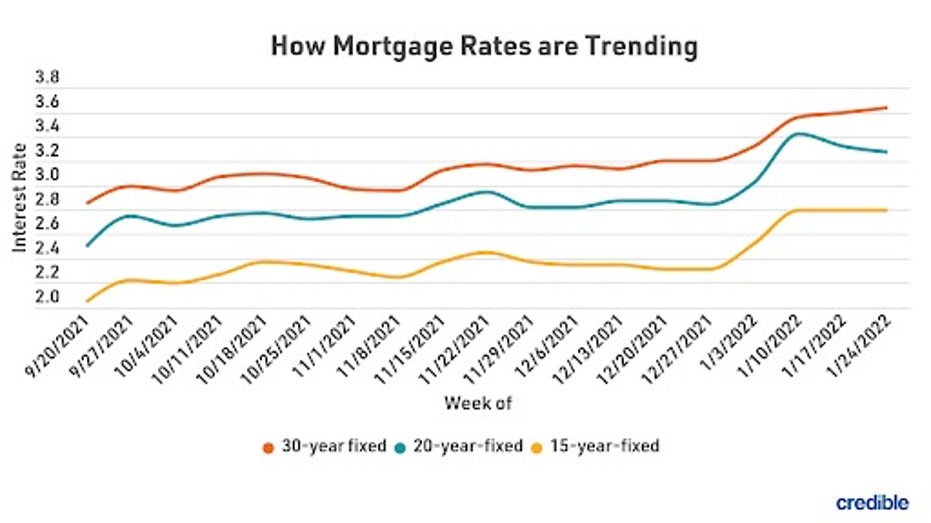Savings window is still open: Mortgage rates open the week at steady lows | Jan. 31, 2022
30-year mortgage rates have lingered below 3.750% for two weeks.

Check out the mortgage rates for Jan. 31, 2022, which are unchanged from last Friday. (iStock)
Based on data compiled by Credible, mortgage rates remained unchanged since last Friday.
- 30-year fixed mortgage rates: 3.625%, unchanged
- 20-year fixed mortgage rates: 3.250%, unchanged
- 15-year fixed mortgage rates: 2.875%, unchanged
- 10-year fixed mortgage rates: 2.875%, unchanged
Rates last updated on Jan. 31, 2022. These rates are based on the assumptions shown here. Actual rates may vary.
What this means: Mortgage rates opened this week holding steady at last week’s lows. Despite slowly rising over the past month, and predictions of future increases in 2022, 30-year mortgage interest rates have been below 3.750% for 14 straight days. Buyers who want a shorter mortgage term can save even more. Rates for 15-year and 10-year terms have held at 2.875% or lower since Jan.12.

These rates are based on the assumptions shown here. Actual rates may vary.
To find the best mortgage rate, start by using Credible, which can show you current mortgage and refinance rates:
Browse rates from multiple lenders so you can make an informed decision about your home loan.
Credible, a personal finance marketplace, has 4,500 Trustpilot reviews with an average star rating of 4.7 (out of a possible 5.0).
Looking at today’s mortgage refinance rates
Based on data compiled by Credible, current mortgage refinance rates edged down for longer refinance terms, while holding steady for shorter terms compared to last Friday. Homeowners considering a cash-out refinance to fund repairs or improvements to their homes have an opportunity to lock in a low rate and secure a manageable monthly payment. If you’re considering refinancing an existing home, check out what refinance rates look like:
- 30-year fixed-rate refinance: 3.625%, down from 3.750%, -0.125
- 20-year fixed-rate refinance: 3.250%, down from 3.375%, -0.125
- 15-year fixed-rate refinance: 2.875%, unchanged
- 10-year fixed-rate refinance: 2.875%, unchanged
Rates last updated on Jan. 31, 2022. These rates are based on the assumptions shown here. Actual rates may vary.
A site like Credible can be a big help when you’re ready to compare mortgage refinance loans. Credible lets you see prequalified rates for conventional mortgages from multiple lenders all within a few minutes. Visit Credible today to get started.
Credible has earned a 4.7-star rating (out of a possible 5.0) on Trustpilot and more than 4,500 reviews from customers who have safely compared prequalified rates.
What credit score do I need to buy a house?
The credit score you’ll need to get a mortgage will vary depending on multiple factors, including the type of mortgage you apply for. Here are the general credit score requirements for some popular mortgage products.
FHA loans
The Federal Housing Administration, part of the U.S. Department of Housing and Urban Development, insures these loans, which are made by private lenders. It’s possible to qualify for an FHA loan with a credit score as low as 500, but you’ll need to have a down payment of at least 10%. With a credit score of 580 or higher, you’d only be required to put down 3.5%.
VA loans
The U.S. Department of Veterans Affairs guarantees a portion of these loans, which are made by private lenders and are only available to active-duty military, veterans, and their spouses. VA loans have no minimum credit score requirement. But the VA guidelines help ensure applicants will have sufficient income to afford the loan.
USDA loans
Very low-income Americans who want to buy homes in certain rural areas may be eligible for a loan from the U.S. Department of Agriculture. The USDA funds these loans, and there’s no minimum credit score requirement.
Conventional loans
A conventional loan is one that’s not backed by any government agency. To qualify for a conventional loan, you’ll typically need a credit score of at least 620 for fixed-rate loans, and 640 for adjustable-rate mortgages, according to Fannie Mae.
Current mortgage rates
Today’s average mortgage rate across all repayment terms is 3.156%, up from 3.063% at the same time last week.
Current 30-year mortgage rates
The current interest rate for a 30-year fixed-rate mortgage is 3.625%. This is the same as last Friday. Thirty years is the most common repayment term for mortgages because 30-year mortgages typically give you a lower monthly payment. But they also typically come with higher interest rates, meaning you’ll ultimately pay more in interest over the life of the loan.
Current 20-year mortgage rates
The current interest rate for a 20-year fixed-rate mortgage is 3.250%. This is the same as last Friday. Shortening your repayment term by just 10 years can mean you’ll get a lower interest rate — and pay less in total interest over the life of the loan.
Current 15-year mortgage rates
The current interest rate for a 15-year fixed-rate mortgage is 2.875%. This is the same as last Friday. Fifteen-year mortgages are the second most-common mortgage term. A 15-year mortgage may help you get a lower rate than a 30-year term — and pay less interest over the life of the loan — while keeping monthly payments manageable.
Current 10-year mortgage rates
The current interest rate for a 10-year fixed-rate mortgage is 2.875%. This is the same as last Friday. Although less common than 30-year and 15-year mortgages, a 10-year fixed rate mortgage typically gives you lower interest rates and lifetime interest costs, but a higher monthly mortgage payment.
You can explore your mortgage options in minutes by visiting Credible to compare current rates from various lenders who offer mortgage refinancing as well as home loans. Check out Credible and get prequalified today, and take a look at today’s refinance rates through the link below.
Thousands of Trustpilot reviewers rate Credible "excellent."
Rates last updated on Jan. 31, 2022. These rates are based on the assumptions shown here. Actual rates may vary.
How Credible mortgage rates are calculated
Changing economic conditions, central bank policy decisions, investor sentiment, and other factors influence the movement of mortgage rates. Credible average mortgage rates and mortgage refinance rates are calculated based on information provided by partner lenders who pay compensation to Credible.
The rates assume a borrower has a 740 credit score and is borrowing a conventional loan for a single-family home that will be their primary residence. The rates also assume no (or very low) discount points and a down payment of 20%.
Credible mortgage rates will only give you an idea of current average rates. The rate you receive can vary based on a number of factors.
How mortgage rates have changed
Today, mortgage rates are mixed compared to this time last week.
- 30-year fixed mortgage rates: 3.625%, the same as last week
- 20-year fixed mortgage rates: 3.250%, the same as last week
- 15-year fixed mortgage rates: 2.875%, up from 2.750% last week, +0.125
- 10-year fixed mortgage rates: 2.875%, up from 2.625% last week, +0.250
Rates last updated on Jan. 31, 2022. These rates are based on the assumptions shown here. Actual rates may vary.
If you’re trying to find the right rate for your home mortgage or looking to refinance an existing home, consider using Credible. You can use Credible's free online tool to easily compare multiple lenders and see prequalified rates in just a few minutes.
With more than 4,500 reviews, Credible maintains an "excellent" Trustpilot score.
How does the Federal Reserve affect mortgage rates?
The Federal Reserve System — or "The Fed," as it’s commonly called — is the United States’ central bank. It’s tasked with taking steps to keep the economy safe, stable, and flexible. Consequently, the Fed controls the U.S. money supply and short-term interest rates, and sets the Fed funds rate, which is the rate that banks apply when borrowing from each other overnight.
But the Fed doesn’t actually set mortgage rates. Rather, multiple things the Fed does influence mortgage rates. For example, while mortgage rates don’t mirror the Fed funds rate, they do tend to follow it. If that rate rises, mortgage rates typically rise in tandem.
The Fed also buys and sells mortgage-backed securities, or MBS — a package of similar loans that a major mortgage investor buys and then resells to investors in the bond market. When the Fed buys a lot of mortgage-backed securities, it creates demand in the market, and lenders can make money even if they offer lower mortgage rates. So rates tend to be lower when the Fed is doing a lot of buying.
When the Fed buys fewer MBS, demand falls and rates will likely rise. Similarly, when the Fed raises the Fed fund rate, mortgage rates will also increase.
Looking to lower your home insurance rate?
A home insurance policy can help cover unexpected costs you may incur during home ownership, such as structural damage and destruction or stolen personal property. Coverage can vary widely among insurers, so it’s wise to shop around and compare policy quotes.
Credible has a partnership with a home insurance broker. You can compare free home insurance quotes through Credible's partner here. It's fast, easy, and the whole process can be completed entirely online.
Have a finance-related question, but don't know who to ask? Email The Credible Money Expert at moneyexpert@credible.com and your question might be answered by Credible in our Money Expert column.
As a Credible authority on mortgages and personal finance, Chris Jennings has covered topics that include mortgage loans, mortgage refinancing, and more. He’s been an editor and editorial assistant in the online personal finance space for four years. His work has been featured by MSN, AOL, Yahoo Finance, and more.




















